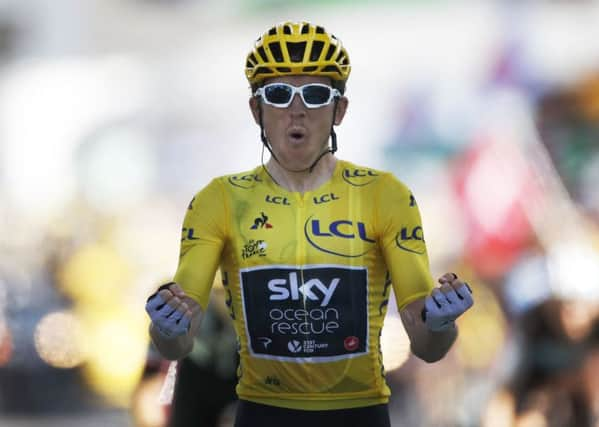Dr Jon Finn: Teamwork, resilience '“ and a good night's sleep, what we can learn from Geraint Thomas


How? We start with a leadership lesson.
Every member of an effective team influences the behaviour of others in that group. So leadership responsibilities are shared – everyone is a leader. Geraint Thomas won the gruelling race but has emphasised how his team helped him.
Thomas explained the role of Chris Froome, who began the Tour as lead rider. When it became clear that he was not capable of winning, the former champion was ready to support the Welshman to win.
Advertisement
Hide AdAdvertisement
Hide AdProfessional cycling teams operate this way. So-called ‘domestique’ riders literally use aerodynamics and positioning to guide their leader through the competing pack, to accumulate stage victories.
Froome’s ability to change to a support role shows great understanding of his shared leadership responsibilities. Despite his initial status as ‘star man’, he was ready to work towards delivering a new collective objective.
There is also a related lesson from Sir Dave Brailsford.
As Team Sky general manager, he presumably had the task of resetting the group’s focus when Chris Froome’s role changed. It is clear he successfully communicated each team member’s new individual responsibilities connected to the team goal of winning the Tour with new leader, Geraint Thomas.
As well as leadership lessons, we can also learn about resilience. There is no doubt that every Team Sky member needed it to prevail in this epic race.
Advertisement
Hide AdAdvertisement
Hide AdEveryone can benefit from resilience because it helps us persist in the face of personal and professional challenges.
The crux of being resilient is good attentional control. This means focusing on certain ‘helpful’ thoughts and ideas. In a post-race interview with BBC Sport, Geraint Thomas indirectly described how he successfully maintained this attentional ‘discipline’ to support his overall progress.
“I’d never thought about the outcome [of the Tour], it was always about the process and doing all the small things right; and thinking about the next climb the next day, the planning and staying calm and collected,” he said.
In another BBC interview his former PE teacher emphasised Geraint Thomas’s excellent resilience resources and how he would apply them during the race.
Advertisement
Hide AdAdvertisement
Hide AdHe said: “If you look at the number of times he’s been injured – in the Tour, when he had a ruptured spleen, Geraint just dusted himself down, got on with it.
“I think that sort of character – who has a lot of inner strength – will be coping pretty well.”
We may not be competing in the world’s most famous bike race but we can develop resilience for our work and lives by maintaining a focus on the small successes and progress we make during any major project or endeavour.
There are many more lessons to learn from Geraint Thomas and Team Sky.
Advertisement
Hide AdAdvertisement
Hide AdDeveloping leadership, powerful teams and resilience under pressure all require a long term effort and an effective framework to guide our efforts.
There is however one immediate takeaway which can help anybody. Alongside coaches and nutritionists, Team Sky employed a ‘sleep doctor’. Good sleep is essential if we want to feel well and at our best.
Neuroscience shows if we get this area wrong, our brains will not function properly and that makes life and work more difficult.
If you want to improve your sleep (or perhaps your diet or exercise) start by making small changes. For example, get five more minutes sleep every night.
Eat an extra piece of fruit or do five extra minutes of fast walking. You can then build on these. Small changes are the foundations of major helpful changes in business and life.